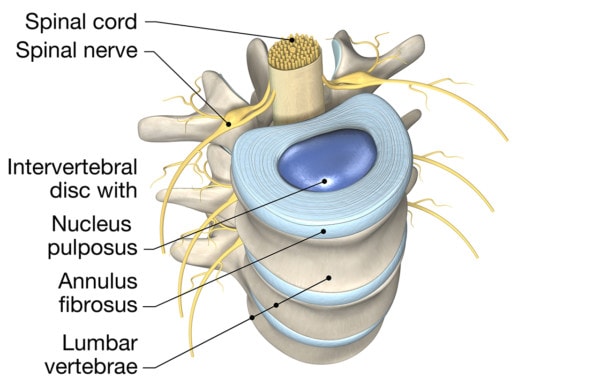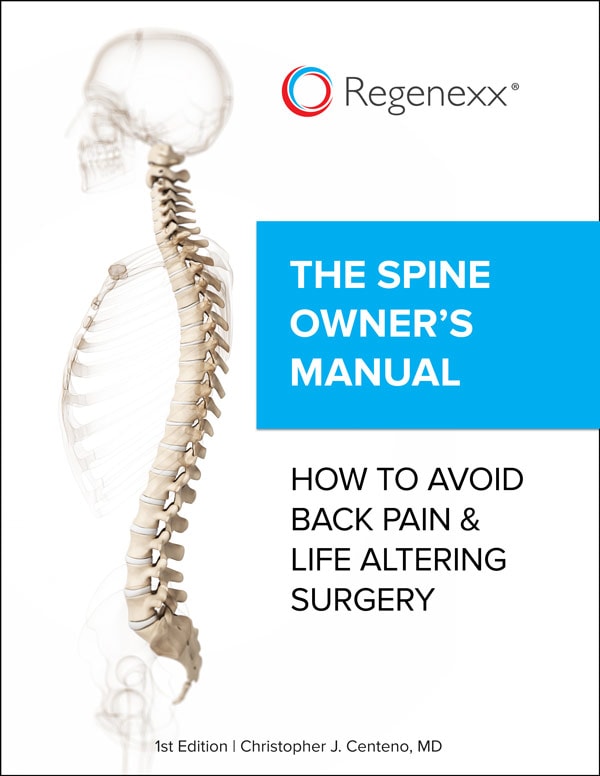Can a Stem Cell Treatment Regenerate My Degenerated Disc?
Way back in 2006, I’m pretty darn sure we were the first clinic on earth to inject mesenchymal stem cells into a human disc. Our hope was that what happened in rabbits, dogs, and rats would happen in people. That patients with severely degenerated discs would grow new ones. Regrettably, that didn’t happen. Now new research continues to explore why.
Understanding Spinal Discs and Disc Degeneration

Axel_Kock/Shutterstock
Intervertebral discs are cushioning spacers that live between the vertebrae (backbones) in the spine. They look a bit like a small hockey puck and are located in the anterior portion, or the front, of the spine. Discs are filled with a gel-like substance (i.e., nucleus pulposus) and covered in a tough tissue called the annulus. They not only absorb shock but also allow for controlled motion in each level of the spine. Common problems with discs include herniations, bulging, tears, and degeneration. Today, we’re focusing on degenerated discs.
To be certain we’re on the same page, what we’re talking about in this post is a disc that is collapsed (lost height) and dried out. The holy grail of stem cell research in the spine is to find a magic injection that will regrow the height and re-create the matrix that holds onto water. How does that work?
Cells live inside the discs and produce chemicals that keep the discs nice and plump so they can properly cushion the vertebrae. Degeneration of the disc occurs when there aren’t enough living cells to maintain the disc, so it begins to break down. It also begins to collapse and get sloppy.
Traditional orthopedics will typically address the problem by performing highly invasive surgeries, such as spinal fusions or disc replacements, which are riddled with side effects. But is there a regenerative medicine option? Let’s review a study by a veterinarian whose recent research confirms what we already know: stem cells can’t regenerate degenerated discs!
Study Only Finds That Dogs with Naturally Degenerated Discs Don’t Respond to Stem Cells
The new study was conducted on German shepherds with naturally degenerated discs. Working under the hypothesis that stem cell injections may regenerate intervertebral discs, researchers investigated how the dogs responded to injections of their own cultured bone marrow stem cells following disc surgery. Three dogs received stem cell injections (test group) and three received a placebo (control group).
The results? There were no clinical differences in outcomes between the test group and the control group, and there was no regeneration found in the discs. The study does report that it found that the dogs receiving the stem cells tolerated them well and without complication (not surprising since they were autologous stem cells, or each dog’s own stem cells), though they plan to use this finding as a first step to researching other ways to use stem cells (possibly adding targeted growth factors to the mix) to treat degenerated discs.
Stem Cell Injections Can’t Regenerate Degenerated Discs
As I said at the start of this article, stem cell injections don’t regenerate degenerated discs. How then could there be many animal models where this appears to happen? These are all stab models, meaning the researchers created what we never see in the real world, a suddenly degenerated disc caused by someone sucking out the inside of the structure. Hence, this is the first study I have seen that looked at whether stem cells could regenerate naturally degenerated discs (meaning these German shepherds had what more closely resembles what patients with degenerative disc disease have).
So if stem cells won’t regrow a degenerated disc that has lost height, what are stem cells good for in the low back? What we discovered was that if you grew them the right way and placed them in the right spot, they can help bulging discs reduce their size. In addition, a same-day stem cell procedure can help patients with painful disc tears but who still have good disc height. To see what a real disc stem cell procedure looks like, see my video below:
Hence, beware, also, of any clinic saying it can use stem cells to regrow discs that have collapsed due to advanced degenerative disc disease. This is a scam. There are no magic stem cells that can grow you a brand-new disc.
To learn more, read my book on regenerative medicine in the spine (click the image below):
If you have less time, check out my video below that summarizes the topic of which disc types respond to which treatments:
The upshot? This animal study is really the first to get it right. Hundreds of millions of dollars have been wasted on research and human clinical trials trying to replicate overly optimistic animal models that used a silly stab injury model. Stem cells won’t reliably regenerate a collapsed degenerative disc. They can do some other important things, and if you read my book, you’ll see what stem cells and platelets can do, when used the right way.

If you have questions or comments about this blog post, please email us at [email protected]
NOTE: This blog post provides general information to help the reader better understand regenerative medicine, musculoskeletal health, and related subjects. All content provided in this blog, website, or any linked materials, including text, graphics, images, patient profiles, outcomes, and information, are not intended and should not be considered or used as a substitute for medical advice, diagnosis, or treatment. Please always consult with a professional and certified healthcare provider to discuss if a treatment is right for you.
